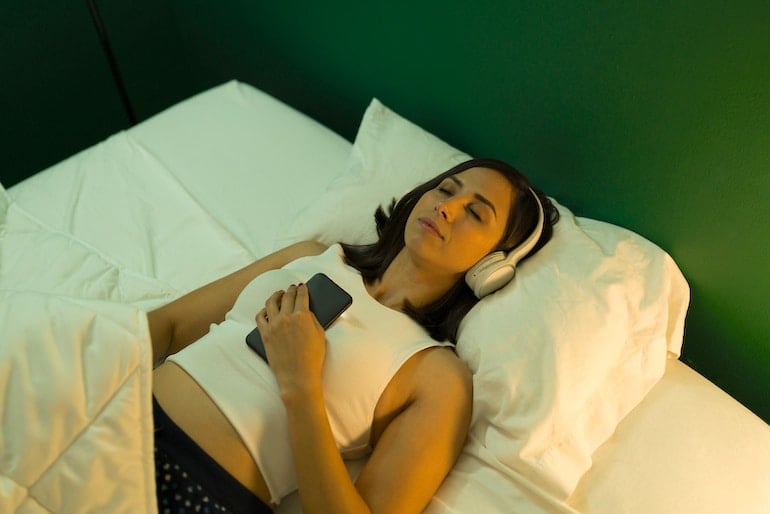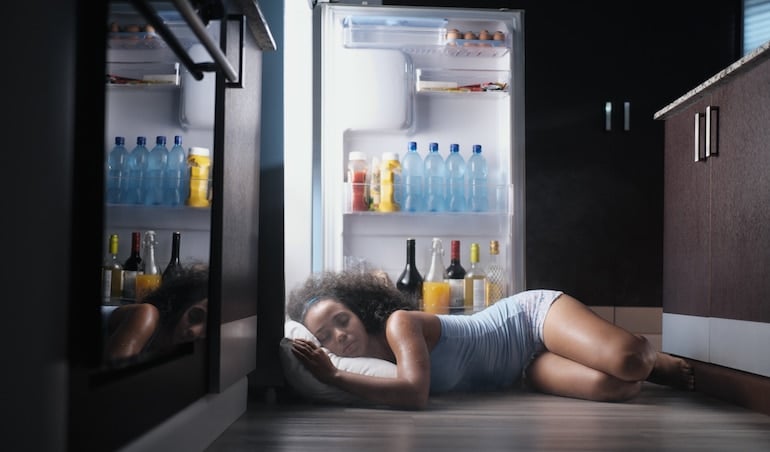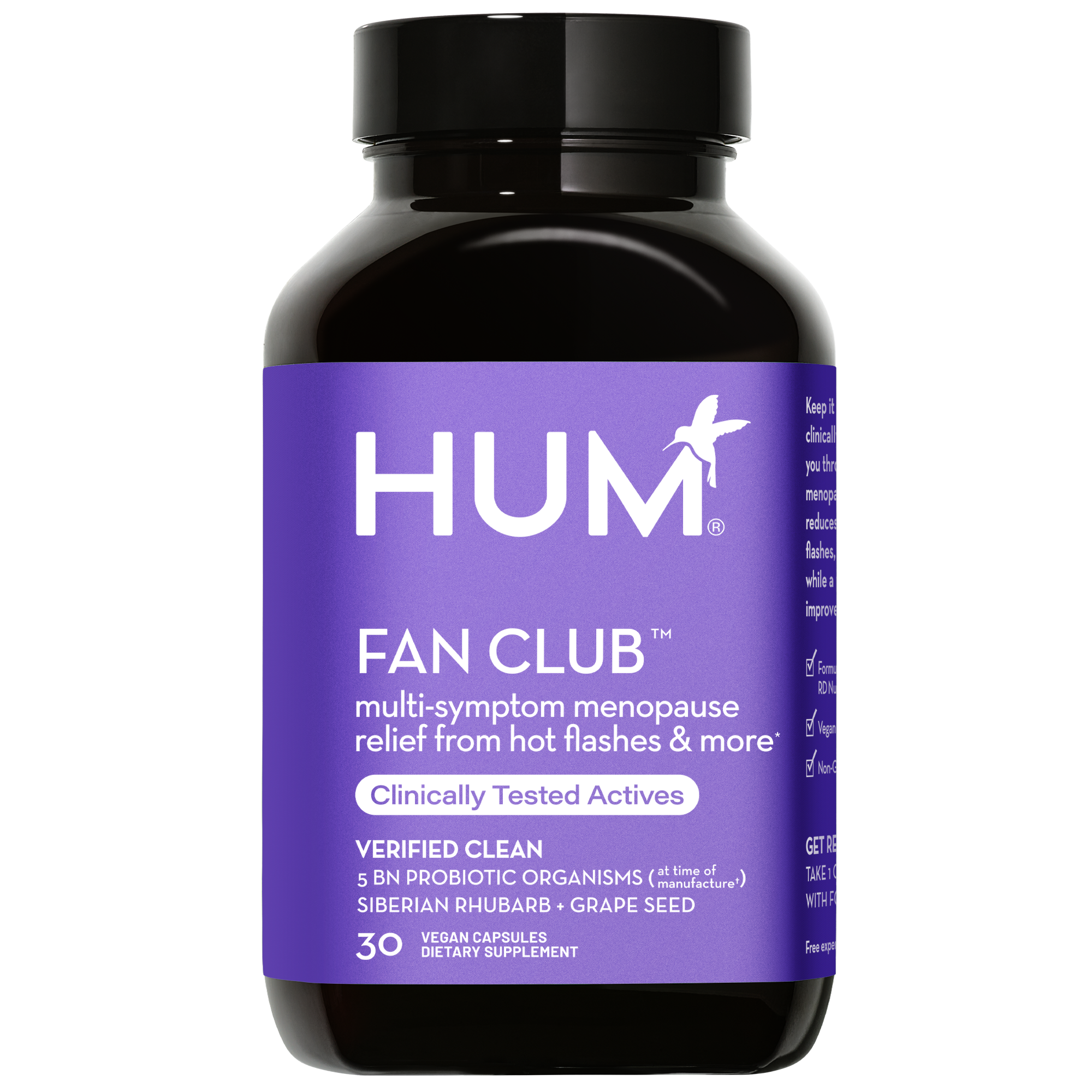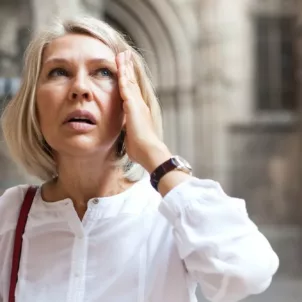Night sweats are unpleasant, at best, and dangerous, at worst. Here’s what causes night sweats—and what you can do to banish them from your bedroom for good.
There’s nothing better than crawling into your bed, snuggling under the covers, and settling in for a long, restful night of sleep. And there’s nothing worse than waking up a few hours later, way before your alarm is set to go off, drenched in sweat and unable to fall back to sleep. Welcome to the nightmare of night sweats.
While these episodes are anything but pleasant when they happen, we have some good news for you: Night sweats are incredibly common, and in most cases, they’re not indicative of a serious medical condition. In fact, they can often be eradicated with a few simple tweaks to your lifestyle or, if necessary, a prescribed medication. Other times, though, they’re a symptom of something troubling that needs to be addressed ASAP. To find out what’s going on with you, you’ll need to put on your detective hat and do a little investigating, because your treatment will depend on what’s causing your nighttime bouts of sweating.
What are night sweats?
Night sweats, also called sleep hyperhidrosis, are exactly what they sound like: profuse sweating in the middle of the night. “Night sweats are episodes of extreme perspiration in which your clothing and bedsheets are not damp but drenched to the point that they require to be changed,” explains Eric Ascher, DO, a family medicine doctor at Lenox Hill Hospital in New York City. “If it happens only for a night or two, it is likely not of concern. These episodes are considered concerning when they occur repeatedly.”
If you fall into that camp, you should check with your doctor. “Night sweats are so common and associated with so many things that it will likely be something simple. But on the off chance that it’s not, it’s better to get a full evaluation,” advises Rashmi Mullur, MD, clinical associate professor of endocrinology, diabetes, and metabolism at the David Geffen School of Medicine at UCLA.
What causes night sweats?
Chances are, you’ve already eliminated the most obvious causes of night sweats: a thermostat that’s too high, a heavy comforter that you forgot to switch out when the seasons changed, and a cold or viral infection that you’re recovering from. Still sweating? Read on for the most common causes of night sweats and what you can do so your sleep isn’t unceremoniously disrupted night after night.
Menopause and perimenopause
If you’re a woman of a certain age, you might expect hot flashes during the day…but extreme sweating in the middle of the night? Yep, put that on your list of common menopause symptoms. According to Dr. Mullur, your brain is releasing hormones that tell your ovaries to work, but your ovaries are slowing down estrogen production. “As a result,” she says, “the hormones from the brain kind of go into overdrive.”
Dr. Ascher adds that as estrogen levels deplete, your blood vessels relax and expand; this, in turn, causes the sensation of heat in the skin. Also, we hate to break the news to you, but in some women, this can also happen in perimenopause, years before actual menopause hits, and last well into their 60s, according to a study published in the journal Menopause in 2015.
So, how can you stop menopause night sweats? If cooling down your living space isn’t enough, your doctor may suggest one or a combination of the following options: a hormonal treatment, a non-hormonal supplement (like HUM’s Fan Club), or the antidepressant Effexor, which works neurochemically in the brain to stop hot flashes. Dr. Mullur also often suggests altering your diet to reduce carbohydrate intake, which can keep the body cool. (More on that below.)

Too many carbohydrates
Don’t worry—we’re not going to tell you to give up your favorites. We are, however, going to tell you not to consume too many of them too close to bedtime. Some people are particularly sensitive to carbo-loading, and their bodies undergo something called adaptive thermogenesis. This metabolic process, says Dr. Mullur, can cause those people to sweat. “This can happen at any time of the day,” she says. “But if you have a huge carbohydrate meal right before bed, that can wake you up in the middle of the night.”
To stop night sweats related to carb intake, she suggests having “mixed meals” that contain a little bit of protein, a little bit of fat, and a little bit of carbohydrates. One word of caution: Carb-related night sweats can also be a sign of pre-diabetes. If it’s happening in conjunction with other traditional signs of diabetes, like increased thirst, frequent urination, and blurred vision, you should definitely mention it to your doctor.
Diabetes
“Diabetes doesn’t necessarily cause night sweats, but night sweats can occur in patients with diabetes if their blood sugar is fluctuating—specifically when it’s dropping,” says Dr. Mullur. That’s because when blood sugar drops, the body releases a number of hormones, including adrenaline (or epinephrine), which tells the body to increase its sugar levels. The problem? “That adrenaline can cause people to have tremors, be sweaty and shaky, and otherwise not feel well.” Essentially, those night sweats are a sign of hypoglycemia, and this usually results from medication that has been given specifically to lower blood sugar.
If you have diabetes, it is important to mention this symptom to your doctor. The solution would likely be to change your medication regimen or even wear a monitor that alerts you when your blood sugar is low.
An overactive thyroid
Your thyroid is like your own personal thermostat, says Dr. Mullur. It needs to be at the exact right level, and it adjusts to your body’s changing needs over the course of the day. “However, if you have an overactive thyroid, your thyroid is not responding to your body’s signals in the way it should, so it’s overproducing hormones rather than producing them as needed,” she says. “In that circumstance, it’s like you’ve got the dial turned up on your metabolism to max.” When your metabolism is in overdrive, your body is expending a ton of energy, which can lead to sweating.
In addition to night sweats, people with an overactive thyroid may feel hot all day long. They may also feel anxious and irritable, be dealing with weight gain, and have bowel movements several times a day. Thyroid medications or another endocrinologist-approved method of treatment will help with these issues.
Stress and anxiety
Think you can escape the stress of the day by heading off to dreamland? Think again. Just because you’re sleeping, it doesn’t mean your brain is taking a break. “Whether you’re having a bad dream or responding to underlying stress you’ve experienced throughout the day,” explains Dr. Ascher, “your body reacts by increasing your heart rate, increasing your metabolism, and increasing body temperature.”
While this may result from a specific stressful situation, it could also be related to an underlying anxiety disorder, which would cause night sweats to recur. “Therapy and anxiety medications work well for this, as does meditation and deep-breathing exercises before bed,” Dr. Ascher adds.

Pregnancy
Creating your own little human can wreak havoc on your body in all sorts of ways, and it will probably come as no surprise that night sweats often occur during pregnancy. What you might not expect are postpartum night sweats, which happen because your once-raging estrogen and progesterone levels have now dropped dramatically. In addition to your fluctuating hormones, your body is also getting rid of the excess fluid accumulated during pregnancy via those night sweats (as well as through increased urination).
According to a 2013 study in the journal Fertility and Sterility, postpartum night sweats peak about two weeks after giving birth. But if you’re also experiencing a fever, a headache that won’t go away, chest pain, or any other concerning symptoms, speak with your doctor ASAP since you could have an infection or other serious post-pregnancy complication.
Alcohol consumption
You feel all warm and fuzzy when you have a cocktail or two, but a few hours later, you might be experiencing full-on night sweats. That’s because alcohol messes with your body’s thermoregulation, according to Alcohol.org. While this tends to happen more with heavy alcohol consumption, some people may experience this after drinking a lot less.
So, what’s going on, exactly? Alcohol causes your heart rate to speed up and your blood vessels to relax and widen. Those dilated blood vessels can make you feel flushed and even sweaty. But as blood continues to travel through those dilated blood vessels to your skin, your body temperature actually drops; sweat is one of the ways that your body cools itself down. While this can happen at any time of the day, since most people tend to drink at nighttime, it can result in middle-of-the-night sweating.

Medications
Over-the-counter and doctor-prescribed medications can be necessary for your health, but they may come with some unexpected side effects. One of them might be—you guessed it—night sweats. As discussed earlier, diabetes medication is one common culprit, but others include antidepressants, breast-cancer drugs, blood pressure medications, sleeping pills, and even everyday pain relievers like aspirin and acetaminophen. Read the fine print when taking any medication, and mention any side effects to your doctor at your next appointment if you think it could be causing night sweats.
Sleep apnea
This sleep disorder, in which your breath actually stops and then restarts during sleep, is associated with a slew of health concerns, from heart disease to stroke. And now, according to a study of middle-aged female patients at the Mayo Clinic, hot flashes and night sweats. Undiagnosed or untreated obstructive sleep apnea is also something that Dr. Mullur sees frequently in patients. Think of it this way, she says: “They are able to get some sleep but not restful sleep, so their body is constantly arousing and they’re in a state of stress all night.”
According to the Cleveland Clinic, some treatments are on the simpler side, such as losing weight, avoiding alcohol, using a wedge pillow to sleep in a side position, and addressing sinus problems. Other interventions range from using Positive Airway Pressure (PAP) therapy (which is basically a mask that regulates airway pressure during sleep) to dental devices that keep the airway open; in extreme cases, surgery may be recommended.
An infection or cancer
When doctors allude to potential causes that are “worrisome” and “dangerous,” this is what they’re talking about—serious undiagnosed issues that need immediate treatment. Symptoms like fevers, weight loss, and general fatigue or malaise in conjunction with night sweats could indicate anything from tuberculosis or a fungal infection in the lungs to blood-based cancers like lymphoma and leukemia, says Dr. Mullur. Another possibility is a neuroendocrine tumor in the gastrointestinal tract or adrenal glands; this isn’t actually cancer but a hormone-producing tumor, and when it’s removed, the body’s functioning returns to normal.
While Dr. Mullur stresses that these diagnoses aren’t the likely causes of most night sweats, it’s best to rule them out if you’re not sure what’s causing your night sweats. Dr. Ascher adds: “While this may seem intimidating, prognosis with these diagnoses is always better when caught and treated early.”
How to stop night sweats
While you now have a full arsenal of things to try, depending on the cause of your night sweats, there are plenty of other ways to stay cool. The following tips are also helpful if you just happen to run hot or, says Dr. Ascher, “when the seasonal temperature changes and your body has not yet acclimated to sleeping with the appropriate number of blankets.”
- Wear lightweight, loose-fitting clothing to bed.
- Use a fan, put on the air conditioner, or crack open a window at night in the warmer months.
- Avoid spicy foods before bed, especially chiles and mustard, which contain the body-temperature-raising compound capsaicin.
- Stay away from caffeine, cigarettes, and drugs before bed, in addition to alcohol.
- Don’t exercise before bed. High-intensity workouts can speed up your metabolism and cause your body temperature to rise.
- Try cooling pillows, bed sheets, and comforters. Linen, cotton, bamboo, Tencel, and certain patented technology can work wonders to keep your body temperature in check.
The bottom line? You’ve got options—and lots of them—so there’s no need to suffer (and sweat) in silence. As Dr. Mullur wisely notes, no one should have to deal with night sweats forever. Keep evaluating until you find the cause so you can finally get the shut-eye you so desperately want and need.









